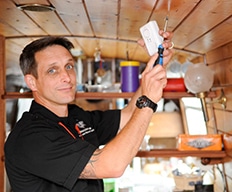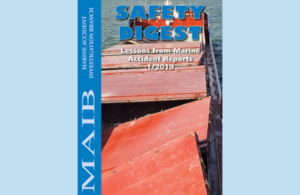Act now, as carbon monoxide alarms become mandatory
 Carbon Monoxide Alarm
Carbon Monoxide Alarm
From 1 April 2019 at least one carbon monoxide (CO) alarm becomes a mandatory requirement on nearly all private and non-private boats in scope of the Boat Safety Scheme (BSS) requirements.
BSS Certifications will not be issued to boats without alarms. The new BSS requirements apply to boats with accommodation spaces i.e. areas within a boat surrounded by permanent boat structure and where carbon monoxide gas may accumulate.
Although the need for CO alarms is being introduced to help protect boat owners from sources of the toxic gas from neighbouring boats, the alarms are also expected to prevent death or injury to crew members from their own boat engines or appliances.
Be alarmed!
There are four new check items in the BSS examination:
- The provision of alarms in suitable numbers – this check ensures everyone on board can hear the alarm if it activates
- An advice check for private boats, promoting a CO alarm in the same space as a solid fuel stove – stoves can present a specific risk if flue gases enter the cabin
- The requirement for CO alarms to be placed in open view, be of a certified quality and have a test function button
- The requirement for CO alarms to be in good and working condition, showing no signs of damage, being within any visible expiry dates and passing the function test using the test button
The BSS has published a new handout as an essential guide to all the new requirements and background information. It covers what is required and how the checks will be carried out by BSS examiners and how the alarms can keep crew members safe, including:
- CO alarm makers guidance about where to place a CO alarm to achieve best protection
- What type of CO alarm to buy
- What to do if a CO alarm goes off
- What to do if carbon monoxide poisoning is suspected
Copies of the essential guide will be distributed by BSS Examiners. It is also available for marinas and boat clubs to distribute. It can also be viewed or downloaded from www.boatsafetyscheme.org.
#GetWiseGetAlarmedGetOut
Stuart Carruthers, RYA Cruising Manager, says: “The message is simple: carbon monoxide kills and an alarm could save your life. But the first line of defence is to know and understand the dangers and sources of carbon monoxide. It’s both colourless and odourless, hence the silent killer tag, and can kill quickly if inhaled in high concentrations.
“At lower levels of CO as it begins to take effect, the symptoms of poisoning are similar to flu or food poisoning, and include headaches, nausea and dizziness.”
CO detectors are commonplace in homes, but less so on boats despite them being the perfect place for the poisonous gas to build up. The RYA recommends fitting an alarm that is certified to the British Standard as suitable for use when camping and/or in recreational vehicles such as boats and caravans, which is known as BS EN50291-2:2010.
Take action
Stuart adds: “CO detectors alarm at a low concentration levels to give a person time to react and regrettably it appears that these are often mistaken as false alarms rather than early warning and are switched off.
“If the alarm sounds, it’s vital to take action to shut off sources of CO (engines, generators, open flame appliances) if safe to do so, get clear of fumes into the fresh air and seek medical attention immediately. By having CO alarms on board as a back-up, you should have a happy and incident-free time afloat.
“Don’t wait until your boat’s next BSS examination to get a CO alarm. Read the handout now and protect yourself and your family from carbon monoxide poisoning today.”
The RYA is committed to increasing public understanding of the risks of CO poisoning in order to reduce incidents, fatalities and ill health related to the poisonous gas. Visit www.rya.org.uk/go/co for more information. 










